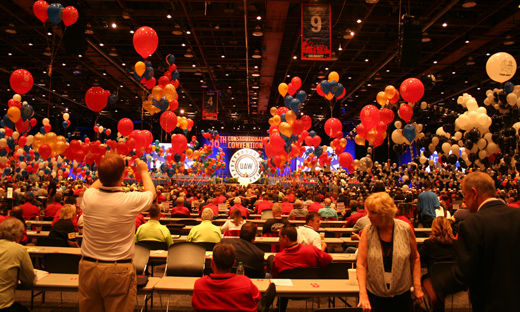
DETROIT – If one were to believe the commercial news media, one would think that the proposal to raise dues was the sole purpose of the United Auto Workers 36th Constitutional Convention here this week. It was not the sole purpose, but it was certainly the most contentious.
Leaders of the United Auto Workers union are well aware of the attacks against workers worldwide. Their fightback program is called “PRO Members.” Significantly, the “R” is for “Resources.” (The “P” is for “participation,” the “O” is for “organizing.”)
Outgoing President Bob King presided over discussion on a resolution calling for adding a half hour’s pay to the union’s traditional two-hours-per-month dues, to boost the union’s fighting power. An exception was made for unionists, particularly some public employees, who do not have a legal right to strike.
King allowed two speakers in favor and two speakers against, for each of the union’s dozen or so regions. Contributors to the discussion were often polished orators. Applause followed each of the many contributions.
Delegates speaking for the resolution emphasized the importance of upcoming contract negotiations. The union faces all three major American auto producers as well as Caterpillar in the coming months. Tens of thousands of jobs will be affected. “Don’t send our teams to fight with insufficient ammunition,” was a common plea.
Other speakers, including King, emphasized that the Steelworkers and other large unions had raised dues long before. The UAW, King said, hadn’t raise dues because they had relatively good reserves. King also pointed out that the union’s dues structure was developed when the UAW still had a million members or more. Today, the union faces these big fights with dues coming in from only around 400,000 members.
Some of the speakers favoring the motion thanked King and his soon-to-be-elected successor, UAW Financial Secretary Dennis Williams, for having toured the nation to conduct the debate over the dues increase over the past six months. Others complained that the union leadership had been undemocratically lining up support for the dues increase.
Delegates opposing the proposal wanted the motion to be tabled in favor of a nationwide referendum of all members. They said they were confident that the members would turn down a raise in their dues. Several of them
complained that the strike fund would be larger if the previous convention had not voted to transfer $25 million each year from the strike fund to the general fund. They also complained that another constitutional change, scheduled for later, was expected to increase the incomes of some of the staffers.
Gary Walkowicz, who would later be nominated to run against Dennis Williams for president, had a big problem making his point. Delegates from Region One in Michigan had been provided with noisy little clickers, which they used to drown out Walkowicz’s talk.
A woman from Region 5 complained on a point of order and President King, who said he had not heard the clickers, allowed Walkowicz to make his presentation again. The clickers were used again the next day during
Walkowicz’s nomination for president.
Another opponent of the resolution brought petitions from his members against the dues increase.
Several speakers pointed out that Michigan and Indiana had joined the growing list of so-called “right to work” states, so that UAW members there would have the easy option of leaving the union. Some predicted disastrous abandonment of the union, especially in locals outside the “Big Three” U.S. auto companies, where salaries are not so good, once the dues increase is implemented. King responded that people had left the union in 1967 when dues went up, but they came back.
After hours of debate, a procedural motion was finally made to end discussion. Another motion quickly followed for a roll call vote.
President King asked for a show of hands to see if there was adequate support, under the rules passed earlier, to require a roll call vote. He ruled the support insufficient, then went to a voice vote on the dues increase proposal. He ruled that the voice vote was indecisive and called for a show of hands, then ruled that the proposal clearly passed.
The result, most here feel, is that when the autoworkers face their biggest contractual challenges in the coming months, they will have the resources they consider necessary for a fight.
Photo: A celebratory scene at the UAW’s 36th Constitutional Convention, June 2-5, Detroit. Jim Lane/PW












Comments